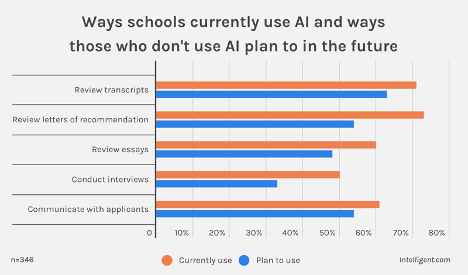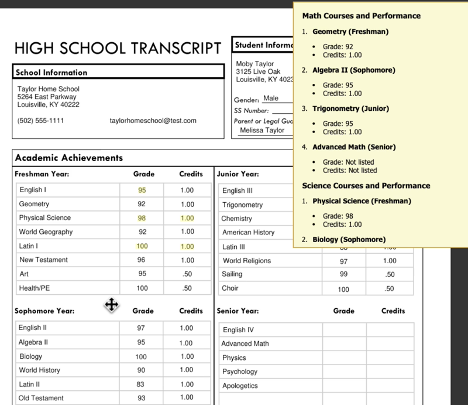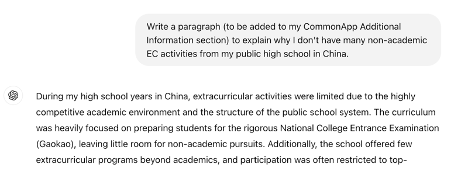Artificial intelligence (AI) is changing the college admission landscape, including one of its most essential components: the college application essay. The Common App and Coalition personal statements have long been essential elements of the college application process. It’s a space where students can share their personal stories, growth, and values—factors that play a crucial role in holistic college admission review.
Traditionally, many students have relied on English teachers, parents, friends, or even paid college admission consultants to help them craft compelling application essays. But these resources are not equally accessible, leaving many under-resourced students without the same level of support. Enter AI: a new player in the college admission game that can help any student with essays and other elements of their applications. Here’s what you should know.
A new era of college writing assistance
When generative AI tools like ChatGPT gained mainstream attention in late 2022, skepticism from the masses quickly followed. Many people raised ethical concerns and questioned the impact of AI on students' writing skills and critical thinking capacities.
Yet, there’s an undeniable upside: AI tools democratize access to high-quality writing assistance. With the vast knowledge bases supported by large language models (LLMs), instant responses, and extremely low or no costs, these tools empower students from diverse socioeconomic backgrounds to receive writing support previously only available to those with greater resources.
Related: The Best Advice, Tips, and Resources for Writing College Admission Essays
How college admission offices are adapting to AI
Almost two admission cycles have passed since the rise of generative AI tools. So how are college admission offices adapting to using these tools and recognizing their use by students? In an email to the Duke University student newspaper The Chronicle in early 2024, the Dean of Undergraduate Admissions explained that they no longer assign numerical scores to essays due to the rise of AI and college admission consultants.
Previously, essay writing accounted for five out of 30 total points in Duke's numerical ratings, which also evaluated categories such as curriculum rigor, academics, recommendations, extracurriculars, and test scores. For the building of the Class of 2024, Duke shifted its focus to essays that highlight "who the unique person is" behind the application, emphasizing values in context and character traits even more.
This shift underscores a broader trend in college admission: Essays are becoming less about polished writing and more about authenticity and personal insight. Duke is not alone in this shift. While it may be the only highly selective university to openly discuss its evolving approach to essay evaluation, its response to the widespread adoption of AI in education has set the tone for many peer institutions.
AI's expanding role in college admission offices
On the other side of the admission tables, college admission teams are increasingly embracing AI tools in the student review process. A 2023 survey by Intelligent.com revealed that half of admission departments were already using AI tools that year, with 82% planning to integrate it into their processes by 2024.

Screenshot courtesy of Intelligent.com 2023 survey data
The AI tools college admission departments now use are primarily employed to analyze high school transcripts, college essays, and letters of recommendation as well as streamline communication between admission counselors and college applicants. For instance, the widely used college recruitment CRM platform Slate Technolutions has already advertised a new AI Reader feature on its road map, which it hopes to launch in 2025. With this feature, institutions can scan student transcripts for fast, efficient committee review.

Screenshot courtesy of product demo video for Slate’s AI Reader feature
This mutual adoption of AI tools by both students and universities reflects the growing recognition of AI as an essential and rapidly expanding part of the application ecosystem.
Related: A New Learning Ethos: What Does the Future of AI Look Like for Education?
How AI affects admission for non-native English speakers
For international applicants and non-native English speakers, generative AI presents both opportunities and challenges. If you’re one of these students, you may find it difficult to articulate your experiences as fluently as US domestic applicants. This can sometimes place you at a disadvantage not only in essay evaluations but also in context-based sections like the Common App’s Additional Information section, where you might need to explain international curriculum differences or lighter extracurricular involvement.
AI tools can help you address this gap by improving language and structure to better communicate your stories and experiences while preserving authenticity. Here’s an example of how to prompt AI to generate contextual responses for helping admission officers understand applications for non-US territories. (Just make sure you’re modifying these prompt responses into your own words.)
The downsides of AI-assisted writing
The challenge comes in when college essays are in the hands of admission officers who are trying to evaluate an international student’s linguistic readiness for rigorous college-level courses. While standardized tests like the TOEFL and IELTS provide test scores on English reading, writing, and speaking proficiency, admission essays serve as direct samples of your writing abilities.
When AI plays a significant role in revising your essays, admission readers may struggle to accurately gauge your English composition skills, potentially leading to an admittance decision that doesn’t fully account for language readiness and ultimately affecting your academic success after enrollment. As AI becomes a more integral tool in the application process, it’s essential for students to balance its advantages and limitations. This means using AI tools to enhance your efforts rather than replacing your authentic work and abilities.
Related: 4 Smart, Responsible Ways to Incorporate AI and ChatGPT in Test Prep
Optimizing your college application preparation with AI
Generative AI tools can be ethically leveraged for your college applications in more places than just your admission essays. Here are some other ways you can utilize AI to streamline the admission process.
Crafting extracurricular activity lists
The Common App activity section requires students to concisely summarize up to 10 extracurricular activities within strict character limits. These entries must include your positions, organization names, and activity descriptions, emphasizing the need for clarity and brevity. Admission reviewers rely on these lists to quickly assess the extracurricular involvement of applicants.
Generative AI can serve as an effective tool for such tasks with clearly defined parameters. By providing clear prompts, you can use AI to create polished, résumé-like activity lists that effectively showcase your involvement and accomplishments. This ensures your hard work is presented compellingly and concisely. If you’re in the early stages of application preparation, AI can also provide actionable insights to help you plan your involvement in these activities more effectively.
![Prompt in ChatGPT reading "I am a college applicant, help me prepare a common app activity list about my 4 year varsity tennis, all-state, senior year captain," and response reading "Here's how you can write a compelling Common App activity list entry for your 4-year varsity tennis experience, emphasizing your leadership, skills, and achievements: Activity Type: Athletics JV/Varsity. Position/Leadership Position: Varsity Tennis Player (4 years); Team Captain (Senior Year); All-State Honors. Organization Name: [Your School's Name] Varsity Tennis Team. Details & Accomplishments: Led team practices, mentored underclassmen, and developed match strategies as captain. Earned All-State recognition for singles performance. Competed in regional and state tournaments, contributing to [School's Name] achieving specific team success, e.g. "state runner-up" or..."](https://images.collegexpress.com/article/ChatGPT-prompt-2-AI-college-applications.png)
Screenshot of ChatGPT extracurricular activities list example
Streamlining operational tasks
Beyond essays and activity lists, the college application process involves numerous logistical hurdles. Students often need to prepare brag sheets for counselors and teachers who are writing letters of recommendation, organize application materials, and create and follow detailed checklists for various deadlines. By automating these time-intensive processes, AI allows you to concentrate on the most critical aspects of your college applications.
Quite a few AI-powered time management tools integrate seamlessly with online calendars. Platforms like Otter.ai offer note-taking tools that transcribe speech to text and summarize discussions during meetings. And email service providers are incorporating AI-driven email writing features. These tools not only boost efficiency but also help reduce your stress during an already challenging period.
Related: The Essential Step-by-Step Guide to College Admission and Applications
In just a couple of years, generative AI has significantly reshaped the landscape of college applications for both applicants and college admission teams. To harness AI's potential responsibly, students should remember to use these tools as aids rather than shortcuts. For high school students and families navigating the college admission process, understanding how to ethically and effectively incorporate AI can make a huge difference.
AI isn’t the only free tool to rely on in the college admission process! Use resources made by real people, like Our Best Advice for Tackling Your College Applications.








